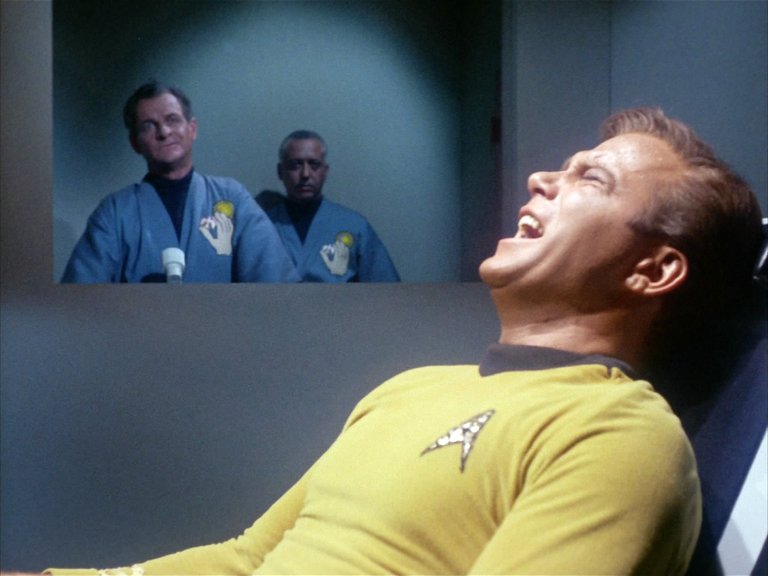
Dagger of the Mind (S01E10)
Airdate: November 3rd 1966
Written by: S. Bar-David
Directed by: Vincent McEveety
Running Time: 50 minutes
The Original Series of Star Trek, while primarily focused on deep space adventures, has often devoted limited attention to the intricate world-building of Earth and the United Federation of Planets. When it did explore these themes, creator Gene Roddenberry made a conscious effort to depict a future where humanity is not only technologically advanced but also significantly more enlightened and progressive compared to the 20th century. One notable episode that exemplifies this vision, albeit through the lens of an action-mystery plot, is Dagger of the Mind.
The episode begins with the USS Enterprise en route to Tantalus V, a planet designated as a penal colony for criminals. Instead of traditional punishment, inmates are treated for their anti-social behaviours by the esteemed psychiatrist Dr. Tristan Adams, portrayed by James Gregory. The Enterprise's mission is ostensibly straightforward—a supply run—but complications arise when a stowaway named Simon Van Gelder, played by Morgan Woodward, uses one of the supply crates to board the ship. Van Gelder is mentally unstable and, upon being subdued, pleads for asylum aboard the Enterprise. Captain Kirk, portrayed by William Shatner, decides to investigate this situation further and is accompanied by Dr. Helen Noel (played by Marianna Hill), a psychiatrist with whom he had previously flirted at a Christmas party. On Tantalus V, they meet Dr. Adams, who enthusiastically introduces them to a device known as the neural neutraliser—a machine designed to pacify violent patients. However, Adams’ staff exhibits an unsettling lack of emotion, raising suspicions about their treatment methods. Meanwhile, aboard the Enterprise, Spock employs a Vulcan mind meld on Van Gelder and uncovers that he was once Adams’ colleague; something has gone terribly awry with both Adams and his device.
*Dagger of the Mind? exemplifies what many consider a classic Star Trek episode, presenting an intriguing premise that speculates about future societal structures and ethical dilemmas. While Roddenberry illustrates humanity's progress in treating criminals with compassion rather than cruelty, he simultaneously issues a cautionary tale regarding the potential for technology to be misused in tyrannical ways. The script by S. Bar-David effectively intertwines these themes within a captivating mystery.
Fans of Star Trek would likely appreciate this episode for its introduction of significant elements within Vulcan lore. Notably, Spock’s use of the Vulcan nerve pinch and mind meld are pivotal moments that enrich the series' mythology. The mind meld scene is particularly noteworthy as it marks the first appearance of this technique in Star Trek, showcasing Spock’s deep connection to his heritage and his commitment to using such powers judiciously.
Despite its serious themes, Dagger of the Mind attempts to inject levity into its narrative through hints of a romantic subplot involving Dr. Noel, portrayed by exotic looking Marianna Hill. This character was introduced as a replacement for Janice Rand due to Grace Lee Whitney's personal and professional challenges during production.
Moreover, Dagger of the Mind holds the distinction of being the first Star Trek episode whose title is derived from a Shakespearean quote. The episode features commendable performances, particularly from Morgan Woodward as Dr. Van Gelder; his portrayal of a mentally disturbed psychiatrist is so intense that it reportedly took him several days to recover after filming his scenes. Woodward left such a strong impression to producers that he later returned to Star Trek, playing another tortured character in the episode titled The Omega Glory.
However, while *Dagger of the Mind? presents intriguing concepts and strong performances, it is not without its flaws. Critics have pointed out plot inconsistencies and character motivations that feel underdeveloped or implausible upon closer examination. For instance, Dr. Adams’ descent into villainy lacks sufficient explanation; while he initially appears as a compassionate figure dedicated to psychiatric rehabilitation, his later actions seem contradictory and unmotivated.
Dagger of the Mind serves as both an exploration of humanity's potential for progress and a cautionary tale about technological misuse, and remains a significant entry within Star Trek: The Original Series, illustrating Roddenberry's vision for a hopeful yet complex future for humanity in space exploration.
RATING: 7/10 (+++)
Blog in Croatian https://draxblog.com
Blog in English https://draxreview.wordpress.com/
InLeo blog https://inleo.io/@drax.leo
InLeo: https://inleo.io/signup?referral=drax.leo
Hiveonboard: https://hiveonboard.com?ref=drax
Rising Star game: https://www.risingstargame.com?referrer=drax
1Inch: https://1inch.exchange/#/r/0x83823d8CCB74F828148258BB4457642124b1328e
BTC donations: 1EWxiMiP6iiG9rger3NuUSd6HByaxQWafG
ETH donations: 0xB305F144323b99e6f8b1d66f5D7DE78B498C32A7
BCH donations: qpvxw0jax79lhmvlgcldkzpqanf03r9cjv8y6gtmk9
Posted Using INLEO